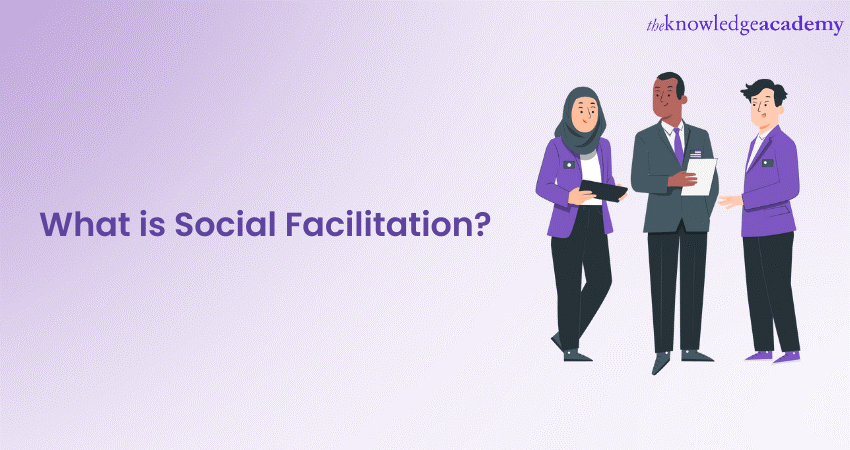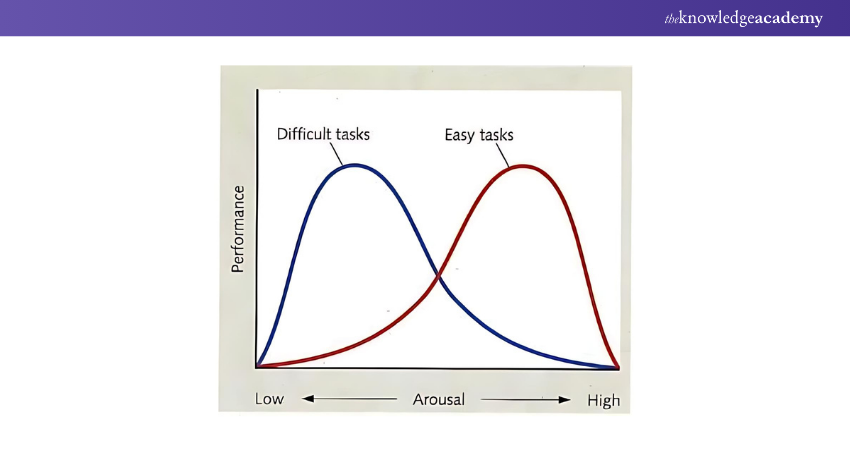We may not have the course you’re looking for. If you enquire or give us a call on +49 8000101090 and speak to our training experts, we may still be able to help with your training requirements.
Training Outcomes Within Your Budget!
We ensure quality, budget-alignment, and timely delivery by our expert instructors.

Have you ever found yourself performing differently when others are watching? Perhaps excelling at a task you're skilled at or stumbling over your words when under scrutiny? Social Facilitation lies at the heart of these intriguing dynamics. But do you know What is Social Facilitation and how the presence of others can influence our performance in various situations?
In this blog, we will discover What is Social Facilitation, how we can use it to increase our performance and when it can cause adverse effects.
Table of Contents
1) Social Facilitation – an overview
3) Different types of Social Facilitation
4) Factors affecting Social Facilitation
5) Various theories on Social Facilitation
6) Social Facilitation examples
7) Other theories aligning with Social Facilitation
8) Conclusion
Social Facilitation – an overview
We often encounter a situation where we have to perform a task, either in front of a group or among people. While completing that task, we feel that we are more efficient when performing among people; rather than when no one is around us. That’s the answer to the question, What Is Social Facilitation?
Whenever we are around people, we tend to work faster with minimum errors. This real presence around us stimulates alertness and increases self-presentation, fear of getting a low evaluation and other factors that affect our work directly. This is how we define Social Facilitation.
It’s common for individuals to mix up Social Inhibition with Social Facilitation. The former suggests that certain people work more efficiently and make fewer mistakes when they are alone, particularly when time is of the essence. In contrast, Social Facilitation is a psychological concept that posits an increase in performance when one is in the company of others. This phenomenon highlights how the presence of an audience can positively influence an individual’s performance.
History and origin
The Social Facilitation definition was given by Norman Triplett in 1898 when he published his paper talking about the effects surroundings can have on a person. He first observed the effect of this phenomenon while cycling. He saw that whenever cyclists were cycling together, they started racing with each other. On the other hand, when the same riders were cycling alone and tried beating the time of another rider, they were comparatively slower.
Another test he took as an example turned out to be somewhat different. To figure out What is Social Facilitation, he asked 40 children to work with a fishing reel. He found through this research that about half of the children performed better when doing the task with the group. While a quarter of those children managed the same efficiency and the other quarter’s performances declined. Such conflicts in behaviours were seen in other studies too.
Later, in 1996, Robert Zajonc came up with the conclusion to Norman’s theory that “Dominant Response” could explain these conflicting behaviours. It means that people are more likely to behave a certain way in the presence of a given stimulus.
Based on this approach, he concluded that if a task comes naturally to a person or they hold experience of it, the presence of other people enhances the person’s performance. But if the task requires a lot of complexity, or the person is just a beginner, they experience a reverse effect of Social Facilitation.
Master your craft and advance your career with our Industry Training – register today and become the expert you were meant to be!
Different types of Social Facilitation
Now that we understand What is Social Facilitation, let’s understand how it is classified. The basic classification occurs on the type of surroundings that brings the effect of this phenomenon. So, let's have a brief look at them:

Co-action effects
Co-action effects can be seen when you find a person surrounded by people performing similar tasks. Here factors like self-presentation theory and feedback loop model play a vital role in enhancing the person’s performance.
Self-presentation theory states that a person will work more attentively when performing the same task as others in order to create a good impression. While in the feedback loop theory, the person tries to become more self-aware and commit fewer mistakes when surrounded by others.
Audience effects
Audience effects are seen when a person is performing a task in front of an audience. Adrenaline rush and alertness are two of the many factors that play a vital role in having this effect. An example of audience effects can be a trained musician playing much better in front of an audience.
Factors affecting Social Facilitation
Now, let us discuss a few crucial factors that play an important role and help us define Social Facilitation:
1) Psychological factors: Getting great results matters a lot for some people when performing in front of a crowd or among their peers. This stimulation affects their work psychologically. If they crave the stimulation more, they tend to become more attentive, focused and self-aware. And if the results do not affect them, then they work on the same efficiency.
2) Cognitive factors: Cognitive factors include distraction-conflict and attention. They say that some people have the quality to excel among people while others bring better results when left alone. Some people might get distracted or too nervous in a crowd, and others might excel based on this factor.
3) Affective factors: Factors like anxiety and stress come under affective factors. Being anxious can be rewarding for some people, while it might become the reason of low efficiency for others. Affective factors determine if self-presentation helps a person increase their performance or harms their work.
Master the art of product innovation and leadership with our Product Management Training – join us now!
Various theories on Social Facilitation
We have already discussed how Social Facilitation can cause changes in a person’s perspective and psychology. Let us further discuss some of its theories:
1) Social Orientation Theory: Social Orientation Theory states that people with positive outlook thrive under Social Facilitation. But people who generally have a negative outlook towards life and can be easily demotivated mostly find a decrease in their performance.
2) Capacity Model: The Capacity Model explains about how a person needs different levels of memory while working on different things. People working on something easy requires less memory compared to those working on something harder. Therefore, Social Facilitation works positively when the task is relatively easier.
3) Evaluation Apprehension Hypothesis: The Evaluation Apprehension Hypothesis states that the fear of negative evaluation causes a person to be more attentive and productive. When more people are evaluated together, the entire team has a higher chance of increasing their performance rather than if they were evaluated individually.
4) Feedback Loop Model: The Feedback Loop Model explains the importance of working while others observe us. When under observation, we never behave exactly like we would if we were alone; instead, we try not to commit mistakes and work more conscientiously.
Other theories aligning with Social Facilitation
Social Facilitation can be productive for one and a demotivating factor for another. Let us understand other theories align with it to have a better understanding of these factors:
1) Yerkes-Dodson Law: Yerkes-Dodson Law states the difference between easy and difficult tasks and how it interferes with Social Facilitation. In a nutshell, if the task is easier, the person will see a growth in performance with Social Facilitation. On the contrary, if the task is much more complex, the person will have the reverse effect of Social Facilitation.

If you compare the amount of arousal with the level of performance and plot a graph, you will find the shape upside-down (U). This graph indicates a clear difference between easy tasks and complex tasks, and this factor affects overall performance.
2) Social Loafing: Social Loafing is a different aspect of Social Facilitation that talks about a situation where all team members are doing a task inefficiently. Social Loafing occurs when every member is less productive than they would be if they were working alone.
Sometimes, the bad social dynamic of the group can be a major factor in causing Social-Loafing. In this case, every member in the group wants to give their responsibility to someone else, causing a lack of motivation and low team spirit. The worse effects of Social-Loafing are the process being delayed and additional labour added to the group.
Examples of Social Facilitation
Let us discuss a few Social Facilitation examples to understand how it has an impact on our daily lives:
1) Co-action effects in the library: When a group of students are studying in a library, we can generally witness Social Facilitation increasing the efficiency of understanding the concepts. Although students gain more knowledge through this process, sometimes, a few students might get distracted, and face reversed effects.
2) Performing simple tasks: When it comes to performing simple tasks, dominant responses may lead to Social Facilitation. Tasks like jogging with friends, cycling and playing a sport increase performance with Social Facilitation.
3) Co-action effects decreasing performance: As discussed earlier, not everyone has a positive effect because of Social Facilitation. For example, if a person fears speaking in public, the anxiety brought by Social Facilitation will only make the matter worse.
Conclusion
We hope that the blog answered, What is Social Facilitation, and how this phenomenon can be advantageous if utilised carefully, or disadvantageous if disregarded. For novices, the key is to hone their abilities in solitude before stepping into the public eye. Conversely, seasoned professionals can strategically employ Social Facilitation to enhance their productivity.
Become a leader in managing tomorrow's spaces - join our Facilities Management Training and transform your future!
Frequently Asked Questions

Social Facilitation enhances performance through the presence of others. Whether it's in sports or work, the presence of an audience or colleagues can increase arousal, motivation, and focus. Positive social interactions can boost confidence, leading to improved productivity and efficiency, ultimately elevating overall performance levels.

Social Facilitation can significantly impact individuals performing difficult tasks. In some cases, it can enhance performance due to heightened arousal and motivation in the presence of others. However, it may also induce anxiety, leading to decreased performance for complex or unfamiliar tasks.

The Knowledge Academy takes global learning to new heights, offering over 30,000 online courses across 490+ locations in 220 countries. This expansive reach ensures accessibility and convenience for learners worldwide.
Alongside our diverse Online Course Catalogue, encompassing 17 major categories, we go the extra mile by providing a plethora of free educational Online Resources like News updates, Blogs, videos, webinars, and interview questions. Tailoring learning experiences further, professionals can maximise value with customisable Course Bundles of TKA.

The Knowledge Academy’s Knowledge Pass, a prepaid voucher, adds another layer of flexibility, allowing course bookings over a 12-month period. Join us on a journey where education knows no bounds.

The Knowledge Academy offers various Industry Trainings, including the Facilitation Skills Training, Facilities Management Training, and Product Management Training. These courses cater to different skill levels, providing comprehensive insights into Democratic Leadership.
Our Business Skills Blogs cover a range of topics related to Social Facilitation, offering valuable resources, best practices, and industry insights. Whether you are a beginner or looking to advance your Business skills, The Knowledge Academy's diverse courses and informative blogs have got you covered.
Upcoming Business Skills Resources Batches & Dates
Date
 Facilitation Skills Training
Facilitation Skills Training
Fri 17th Jan 2025
Fri 28th Mar 2025
Fri 23rd May 2025
Fri 27th Jun 2025
Fri 8th Aug 2025
Fri 17th Oct 2025







 Top Rated Course
Top Rated Course



 If you wish to make any changes to your course, please
If you wish to make any changes to your course, please


